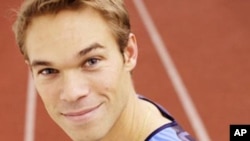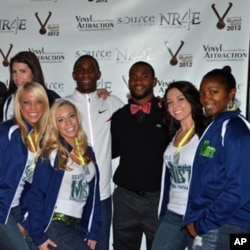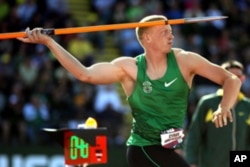For American athletes, dreams of Olympic glory usually include scrounging for dollars. In the United States, the government provides no training support for Olympic-caliber athletes, so some elite athletes have developed creative personal fundraising ideas.
For 800-meter runner Nick Symmonds, the road to London goes through Kansas, Philadelphia and Los Angeles, where track meets will be held before the U.S. Olympic team trials in Eugene, Oregon, this June.
At the Kansas meet, where Symmonds finished in the middle of the pack, he wore a temporary tattoo of a twitter handle on his shoulder.
"I actually put my shoulder up for auction on eBay this last January," Symmonds says, "with more of the intention of raising awareness to the struggles athletes go through as they try to make ends meet and prepare for their Olympic dream."
A marketing agency from Wisconsin bought the ad space on his shoulder.
"Ultimately, Hanson Dodge Creative won with a bid of $11,100," Symmonds says, "which was significantly more than what I ever thought a couple square inches of my left shoulder would be worth."
This auction is one of the more creative gambits by America’s Olympic hopefuls. In some respects, Symmonds is better off than most. He has enough sponsorship so he can train for the London Games full time. Other athletes juggle hours of daily workouts and out-of-state competitions with part-time jobs that don't quite make ends meet.
In Seattle, distance runner Rose Wetzel and hurdler Falesha Ankton recently scheduled a joint fundraiser at a cocktail lounge.
"It felt kind of weird to have a fundraiser for myself and for my goals," Wetzel says. "But more and more people said that it was a great idea and that they wanted to support me and support us."
Wetzel also resolved her qualms by donating a third of the proceeds from the drink specials, ring toss and raffle to the Special Olympics.
Former University of Washington standout Norris Frederick hopes to punch his ticket to London in the long jump.
His fundraising hook was a celebrity date auction. You could bid to go out with the Olympic hopeful himself, or other famous athletes from the school, or members of the female Seattle Mist lingerie football team.
There's no lingerie on javelin thrower Cyrus Hostetler's personal website, but there are lots of bulging biceps. The site promotes his Olympic quest and solicits donations.
"Some sponsored athletes, they've got it made," Hostetler says. "They've got all the equipment they need. But when you’re still trying to make your mark in history and make those big throws, you've got to make you own ends meet. I've been trying to do that through my own website."
For a while, the University of Oregon grad posted his monthly budget in all its frugal detail.
"I struggle to make rent, to make food payments, things like that," Hostetler says. "I just want it to be an open book."
Unlike competitors in some other sports powers around the world, U.S. Olympic athletes receive no government support.
U.S. Olympic Committee spokesman Mark Jones says American athletes sometimes have to be more creative than others to support themselves, but he wouldn't say team USA is at a disadvantage.
"It's hard to argue that our system is broken when our teams have been as successful as they have been over the last several quadrenniums," he says.
Jones hasn't heard of any American athletes going as far as a luge racer from Tonga, in the South Pacific. Born Fuahea Semi, he legally changed his name to that of his sponsor, Bruno Banani. In case you don't recognize it, that's a German underwear and swimsuit brand.






